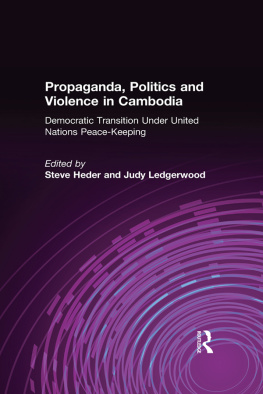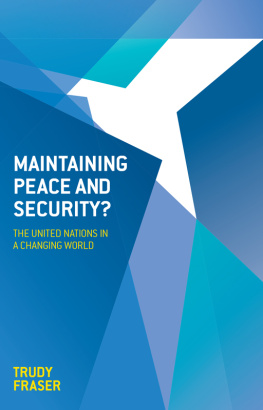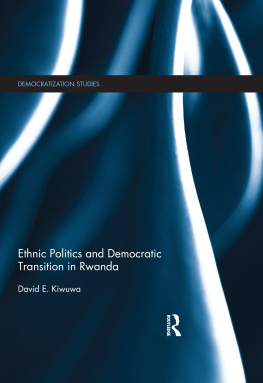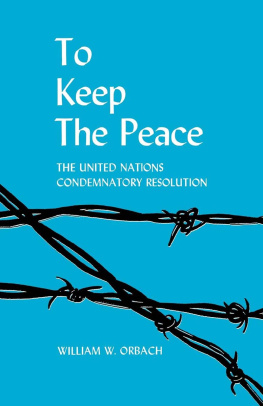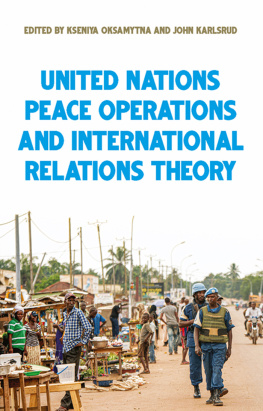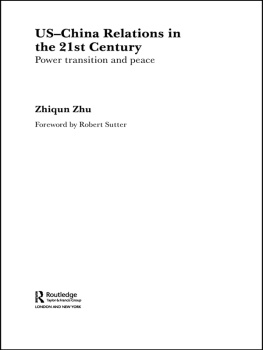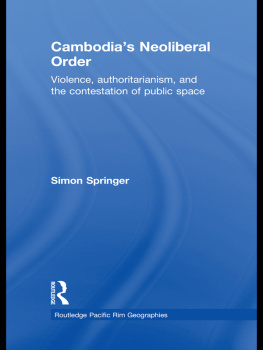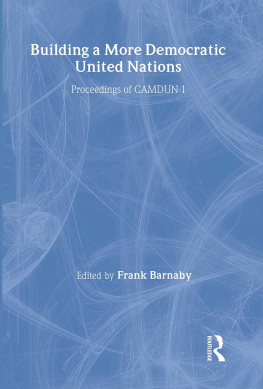Propaganda,
Politics, and
Violence in
Cambodia
Propaganda,
Politics, and
Violence in
Cambodia
Democratic Transition
under United Nations
Peace-keeping
Edited by
Steve Heder
Judy Ledgerwood
with a Foreword by
David Chandler
First published 1996 by M.E. Sharpe
Published 2015 by Routledge
2 Park Square, Milton Park, Abingdon, Oxon OX14 4RN
711 Third Avenue, New York, NY 10017, USA
Routledge is an imprint of the Taylor & Francis Group, an informa business
Copyright 1996 Taylor & Francis. All rights reserved.
No part of this book may be reprinted or reproduced or utilised in any form or by any electronic, mechanical, or other means, now known or hereafter invented, including photocopying and recording, or in any information storage or retrieval system, without permission in writing from the publishers.
Notices
No responsibility is assumed by the publisher for any injury and/or damage to persons or property as a matter of products liability, negligence or otherwise, or from any use of operation of any methods, products, instructions or ideas contained in the material herein.
Practitioners and researchers must always rely on their own experience and knowledge in evaluating and using any information, methods, compounds, or experiments described herein. In using such information or methods they should be mindful of their own safety and the safety of others, including parties for whom they have a professional responsibility.
Product or corporate names may be trademarks or registered trademarks, and are used only for identification and explanation without intent to infringe.
Library of Congress Cataloging-in-Publication Data
Propaganda, politics, and violence in Cambodia: a democratic transition under
United Nations peace-keeping / edited by Steven Heder and Judy Ledgerwood.
p. cm.
Includes bibliographical references (p.) and index.
ISBN 1-56324-664-3 (hard : alk. paper).ISBN 1-56324-665-1 (pbk.: alk. paper)
1. CambodiaPolitics and government1975
2. Political atrocitiesCambodia.
3. United NationsCambodia.
I. Heder, Steven R. II. Ledgerwood, Judy, 1959
DS554.8.P77 1995
959.604dc20
95-31350
CIP
ISBN 13:9781563246654 (pbk)
ISBN 13:9781563246647 (hbk)
Contents
Steve Heder and Judy Ledgerwood
Penny Edwards
Steve Heder
Judy Ledgerwood
Jay Jordens
David Ashley
Kate Frieson
John Marston
David Ashley became interested in Cambodia while an undergraduate at Cambridge University. He subsequently wrote his B.A. and masters theses on aspects of the Democratic Kampuchea regime and published a study of the evolution of PDK political thinking from 1975 to 1991. He has worked for the Indochinese Refugee Information Center at Chulalongkorn University, Bangkok, and for Amnesty International in London. After completing his M.A. at the School of Oriental and African Studies of the University of London, he joined UNTAC, first in the Information/Education Division and later as a human rights investigator in Battambang Province and Phnom Penh. He subsequently worked as translator and aide to the Cambodian minister of economics and finance.
Penny Edwards, now working on her Ph.D. in Cambodian history at Monash University, holds a B.A. (Hons.) in Chinese from the School of Oriental and African Studies, London University and an M.Phil, in International Relations from Oxford University. She has studied and worked in China for several years, and held the position of Information Officer for UNTAC from 199293. From 1993 to 1994, Edwards studied at the Department of Government in Cornell University as a Fulbright Scholar.
Kate Frieson received her Ph.D. from Monash University in Australia. Her doctoral dissertation, completed in 1991, is titled The Impact of Revolution on Cambodian Peasants: 19701975. She has worked for the Social Science Research Council in New York as a program associate on the Southeast Asia and South Asia programs and for UNTAC as an analysis officer in the Information/Education Division. Since 1994, she has been a visiting assistant professor in the Department of Pacific and Asian Studies of the University of Victoria, Canada. She has published several articles on Cambodian politics.
Steve Heder has been a student of Cambodian politics since 1969, when he first visited the country. He has a B.A. in Asian studies and an M.A. in government from Cornell University. He covered the war in Cambodia as a journalist from 1973 to 1975. He did research on the Thai-Cambodian border and in Phnom Penh from 1979 to 1983 while a fellow at the Institute of Asian Studies of Chulalongkorn University and again from 1990 to 1991 as a fellow of the Research School of Pacific Studies of the Australian National University. He also worked on Cambodia for Amnesty International for seven years. He is the author of several articles and monographs on Cambodia. During the UNTAC period, he was a deputy director of its Information/Education Division. He is currently finishing his Ph.D. in politics at the School of Oriental and African Studies of the University of London.
Jay Jordens first visited Cambodia in 1987 on a short holiday from the University of Hanoi, where he was studying Vietnamese language. One year later he became the first Western student since 1975 to be granted a visa to study Khmer at the University of Phnom Penh. In 1990, he graduated from the Australian National University with a bachelor of arts in Asian studies and a year later took an honors degree in politics at Monash University. When not in Cambodia, he works with disadvantaged young people in Melbourne, Australia.
Judy Ledgerwood received a doctorate in anthropology and Southeast Asian studies from Cornell University in 1990. She lived and worked in Cambodia for more than three years between 1989 and 1993, directing the Cornell University Library Conservation Project, teaching at the University of Fine Arts, and conducting research on women and village economics, gender ideologies, and culture change. She is the coeditor of Cambodian Culture Since 1975: Homeland and Exile (1994) and author of several articles on Khmer culture. She is currently a fellow in the Program for Cultural Studies of the East-West Center.
John Marston is a Ph.D. candidate in anthropology at the University of Washington. He has a background as a teacher of English as a second language and in that capacity worked in refugee camps in Thailand and the Philippines. He taught in a volunteer summer English program in Phnom Penh in 1990. His Annotated Bibliography of Cambodia and Cambodian Refugees was published in 1987, and his essay, Metaphors of the Khmer Rouge, appeared in Cambodian Culture Since 1975: Homeland and Exile.
The essays that follow provide a nuanced view of politics, propaganda, and violence in Cambodia. They focus on the period of the United Nations Transitional Authority in Cambodia, better known as UNTAC. The collection does great credit to its seven authors, who are all Cambodia specialists and former UNTAC employees. Their work also opens up several interesting lines of inquiry. For example, after reading the collection, we might well ask: How much of what is described can be called traditional and how much was contingent on UNTAC? What role, if any, did Cambodian culture play in the countrys turbulent recent history? Did Cambodians ideas of politics, violence, and information alter in the UNTAC era? The volume poses fresh questions, also, about links among ethnicity, violence, and nationalism, the nature of propaganda, the notion of human rights, and the responses of the Khmer Rouge to the Paris agreements.

